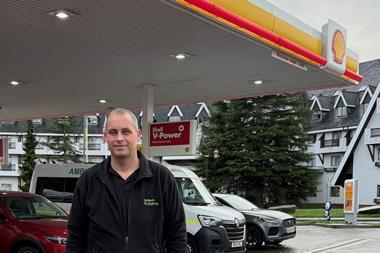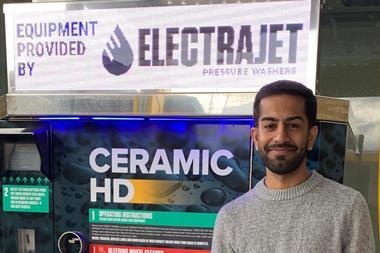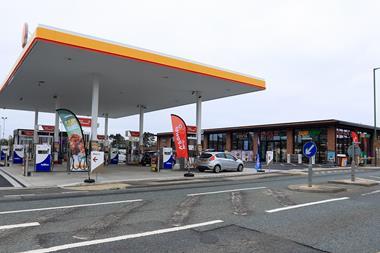Shell has been through many changes in the management of its UK company-owned retail network in the past decade – and it’s about to embark on another one. The last radical changes came towards the end of the ‘90s when, after several years trying to settle on a variety of retail formulas to fit with a dramatically changing market – some of which seriously challenged its relationship with retailers – it went back to basics.
It gave up its attempt to be a leading convenience retailer and decided to re-focus on being a quality fuels retailer. It tore up the retailer agreements that had caused major problems, and declared it would treat its operators ‘honestly and with dignity’. It sold off about 300 sites, and dispensed with direct-managed operations.
Since then, there has been the relative calm of the Retailer Business Agreement (known as RBA), which was updated to the RBA2 when those agreements came up for renewal in 2003.
Now it’s time to move on again – to multiple-site operation. Shell’s latest strategy is for its company-owned sites to be run in groups of about six, operated by one organisation – be it as a sole trader, partnership or limited company, or large group. Current RBA2 operators – and anyone else who might be interested – are being invited to apply for the deal, which will involve a three-stage assessment process. There will be winners and losers.
The man charged with delivering this news to concerned RBA2 operators up and down the country through a series of roadshows is Simon Grimsell, Shell’s retail sales manager for the UK and Ireland. He is effectively Shell UK’s top retail man, following a major global restructure completed at the end of last year, that has given his boss, John Rasmussen, general manager, sales, for the UK and Ireland, responsibility for the Nordics (Norway, Sweden, Finland and Denmark) as well.
“At Shell UK we’ve been pursuing a consistent strategy for the past four or five years which is about delivering quality fuels at competitive prices,” says Grimsell. “It’s a strategy that’s driven double-digit growth in fuel volume for us over the past three years. We’ve delivered a profit in line with the shareholders’ expectations in each of those years – despite the thoughts of some of our competitors and other commentators – and in line with the Shell Group’s view that each business must stand in its own right.”
In terms of its company-owned business, Grimsell says Shell now has a “robust network” of about 570 sites, the size of which is unlikely to change significantly in the near future. The shop offer is Shell Shop, and a new format rolled out on about 100 sites in the past year is focused on providing customers with the things they want when they are on the move. The shops are supplied by Palmer & Harvey. Select will disappear for good.
Grimsell stresses that the move from direct-managed operations in 1999 to the RBA in 2000 is something that has worked “fantastically well” for Shell and the people operating in the sites.
“But all the time we have been looking at how we can more efficiently manage the costs through that process,” he explains. “Following RBA2 we moved into a global retail organisation and one impact of that is that we now look at things consistently on a global basis, to help improve efficiency. The intention is to offer a limited number of agreement types on our company-owned sites around the world – the RBA being one of those. The basic terms of the Global RBA agreement will be common, but certain aspects will vary by market.
“The single biggest change we’re announcing is that we’re moving to multiple-site operation, where a single operator runs a cluster of, on average, about six sites. The advantage for a retailer as a multi-site operator is the enhanced earnings opportunity. The advantage for us is that we get the best, most entrepreneurial retailers, who are aligned with delivering Shell’s value proposition and can drive the business forward.”
Current earnings on RBA2 range from £20,000 to £35,000 for a single site – the average is about £27,000. The earnings potential is capped at 40% of estimated earnings. Shell claims potential earnings on the new contract will range from £60,000 to £100,000 depending on cluster size and site performance, the average being £80,000. These earnings will be uncapped, with the potential for earnings to grow significantly, according to Grimsell. An additional labour allowance has also been added, worth, on average, £35,000 per annum over a typical six-site cluster.
Other changes will affect cashflow. Instead of Shell holding the funds as at present, money will be banked directly into a retailer account and Shell will take its share from that.
“That’s a massive cashflow advantage to the operator,” stresses Grimsell. “The deal moves from having periods of negative and positive cashflow to a deal that is very strongly positive in terms of cashflow. Also car washing is not included in the deal – there will be a new, separate agreement. The current agreement is based on assumed sales, so if an operator had no sales we still take our share. Clearly that creates a massive cashflow issue. The precise terms of the new car wash agreement are still to be concluded. One of the options is to move it to a turnover-related deal, which would be much fairer as it is based on how much the car wash actually performs.”
Describing the new contract as a “strong cashflow deal”, Grimsell says limited working capital is required. However, Shell will be looking for security for its exposure, and will be asking for some form of bank and personal guarantees to cover that.
“All retailers need to be able to provide us with a bank guarantee of a minimum of £100k, plus additional security by way of a personal guarantee, the scale of which will depend upon each individuals’ circumstances and financial background/trading history. However, the fundamental agreement in terms of the RBA will be the same. The retailer gets a commission on the fuel and we share the shop profit on a 50/50 basis.
“The GRBA has been put together in conjunction with retailers – I don’t think you can do it any other way. You can’t talk to everybody, but we’ve made an effort to talk to a range of retailers throughout the country to get a robust input into it.”
The three-stage qualification process to become a multi-site operator includes a credit check; an internal desktop exercise to evaluate the performance of existing retailers; then a third stage when retailers present their business plan. At each of those stages people could drop out.
“The ones that do will be told face-to-face what’s happened,” says Grimsell. “In the context of the second stage they will be told why we have decided not to go forward with them. Thereafter they will continue to operate their current site under their current agreement until such time as we would then give them notice of termination. There is no compensation. There are three reasons for which we can terminate a site: non-compliance of our procedures; significant redevelopment; or for moving sites into a group operation. Notice is a minimum of three months. We would strive to do more than that, and clearly what we’ve been through in the past couple of months is the first stage of that communication process. It’s absolutely critical for us to be open, clear and honest as early as possible for every single individual involved, given the impact on that individual.
“I would hope nobody feels abandoned. It’s fundamental to me that people feel they’ve been fairly treated. We acknowledge that these are people whose businesses have done very well for us, and we want to maintain a positive relationship with those individuals until such time as their current agreement comes to an end. If at any time anybody thinks we haven’t adhered to the principles that we set out in the roadshows about being open and honest in our communications, they should pick up the phone – to me, to John, to their regional manager – and tell us.
“We have about 400 retailers on our sites at the moment. It’s impossible to say how many will stay – some might partner, and some might go to work for a multi-site operator. We’ll have about 100 clusters. Already 65% have applied for it. We’ve completed one-to-one meetings with 80% of retailers so far.”
All existing retailers who pass have to go on a one-week training course, the cost of which will be covered by Shell, excluding travel and accommodation. New-to-Shell retailers will be required to go on four weeks’ site training on top of this, the costs of which are shared between Shell and the new retailer, and payable to the retailer who does the training.
As to the timescale, Shell is currently asking for applications and will quickly do the credit checks. Through May and June it will do the desktop assessment exercise. The business interview will take place during July and August.“We will be able to communicate to the vast majority of our retailers as to whether they have been successful or not by the middle of this year,” says Grimsell. “We will start the rollout in terms of moving the sites into clusters in September, with a plan to complete within the following 12 months. So for some there will be a significant notice period.”
“Everybody will be given the opportunity to apply for this deal. We’re saying ‘here is the opportunity to run a very significant business, with a strong cashflow, and earn a significant income’. It’s about having the skills to manage a sizeable business. The return on offer is in line with that.
“With a group of sites there are efficiencies and benefits we can drive out for the value of Shell and the operator, that reinforce our overall proposition – being able to satisfy the customer.”
Retailer reaction to cluster contracts
It’s dreadful – it was a big bombshell. There are people who have been with Shell for 10 or 20 years, and we were sitting in a meeting with about 100 people knowing that five in every six of those people will be out on their backside with three months notice. It’s a cost-cutting exercise and standards will deteriorate. I won’t be applying because I haven’t got the money – you need over £200,000. Even if I did have the money I don’t think I would want the headache. It’s too much aggravation for not enough money. It’s not a good deal. I’m a single parent and joined the company a year ago for the security, so now I’ll have to look for something else, but I’m coming up to 50 so it’s not easy. Nobody I’ve spoken to is going for it. I don’t think anyone wants to run six sites for the same money as two or three sites. Those that are going for it think they have no other option.
I don’t think it will work. I can’t see how people will keep up the standards if they are expected to be in six places at once. I will be applying because I need a job at the end of the day – I’m not in a position to get out. But I’m not looking forward to it if I am successful. I’ve got two Shell sites at the moment. One is a good site and I earn a decent living from it. But Shell isn’t doing this to help us make money – it’s a cost-cutting exercise. Last year we had everyone’s hours cut and all the staff are on minimum wage. Shell’s decisions always seem stacked in its favour. I’ve been in the business for 22 years – I was with Shell as a manager when the network was direct managed. I’ll have to put my house up against it and I’ve never had to do that to keep a job. Because of the way Shell is treating us this year, it makes you wonder what is around the corner. I wouldn’t trust Shell as far as I could throw it. Shell has a very blasé attitude about it. It’s like its saying ‘If you don’t want it, someone else will’. It’s experience Shell’s after. You couldn’t come into the business and successfully run six sites straight away.
I think it’s a good opportunity. It enables you to run more sites, which gives you more staff flexibility. If you’ve got a larger workforce, you can operate a swap-round rota, which makes things easier if a member of staff doesn’t turn up. And the bigger you become, the stronger you get. For example, you can get better deals on accountancy. I’ve applied for it and am now waiting with bated breath. It’s a cash-positive contract so you’re only backing what you’ve already got. In that respect I’m not worried. I have three sites at the moment, but I once had five sites of my own. But with the environmental implications, I sold them all in 1998. If I’m selected I’ll be back where I started but without the environmental issues. If anything goes wrong, it’s because I’ve managed them badly. But I haven’t got the worry of a tank bursting for example, as that’s down to Shell. As far as I’m
concerned, it gives me the opportunity to operate a large business that can generate
a reasonable amount of money. I’m looking forward to it.
It was a real bombshell. We will have to form a limited company and provide Shell with a minimum of £200,000 straight off. We asked what would happen if it didn’t work out and Shell said there was no guarantee we’d get the money back. The new agreement is heavily in favour of the oil company. There’s no way you can raise the money because there’s no business plan – you don’t know what the projections are because there are no trading accounts. We don’t have any bona fide figures; they are hypothetical figures, so you can’t project the costs. Also, if Shell doesn’t like the way you’re running the business it can just red card you. The contact says it has the power to terminate the contract for failure to follow procedures. If Shell doesn’t want you anymore it’ll find something wrong. I’m coming out of it altogether now. At our meeting, the consensus of opinion was that it’s a total waste of time. At the roadshow, people who had been with the company for 15 years were walking out. I believe Shell has a hidden agenda – I think it’s about to transfer the sites over to somebody because I can’t see it leaving itself totally exposed to having no one to run them.
It’s another attempt by Shell to cut costs but I can’t see how it will benefit the Shell network – and the customers – in the long run. It’s not something I’m taking up. The sort of money Shell is looking for is out of my league. When I came into the business seven months ago, I did envisage running more than one site, but not as many as six sites. It’s been presented as an opportunity to earn a large amount of money, but I doubt that will happen. You’d probably spend an average of six hours a week on each site so you’d be relying on supervisors. I’ll be interested to see how it will work. Seventy per cent of those Shell was presenting to will be out of a job, which isn’t a pleasant way of doing things. But that’s par for the course with Shell. It’s been highly de-motivating and because I’m quitting within one year, I stand to lose my start-up bond.
Close menu
- Home
- News
- Reports
- Fuel
- Retail
-
Shop
- Back to parent navigation item
- Shop
- Shop Suppliers
- Alcohol
- Batteries
- Breakfast
- Car Care & Lubricants
- Chilled & fresh
- Confectionery
- Food to go
- Health & Beauty
- Hot Beverages
- Ice cream & frozen
- Mint & Gum
- Sandwiches & Snacks
- Seasonal
- Soft drinks
- Tobacco & Vaping
- Focus On Features
- A to Z of all Subjects
- Equipment
- Events
- Vision
- Newsletters
More from Analysis
- Related Websites:
- Forecourt Trader Awards
- Grocery Retail News
- Convenience Store
- Industry Links:
- Petrol Retailers' Association
- Fuels Industry UK
- Lumina
Site powered by Webvision Cloud

































No comments yet